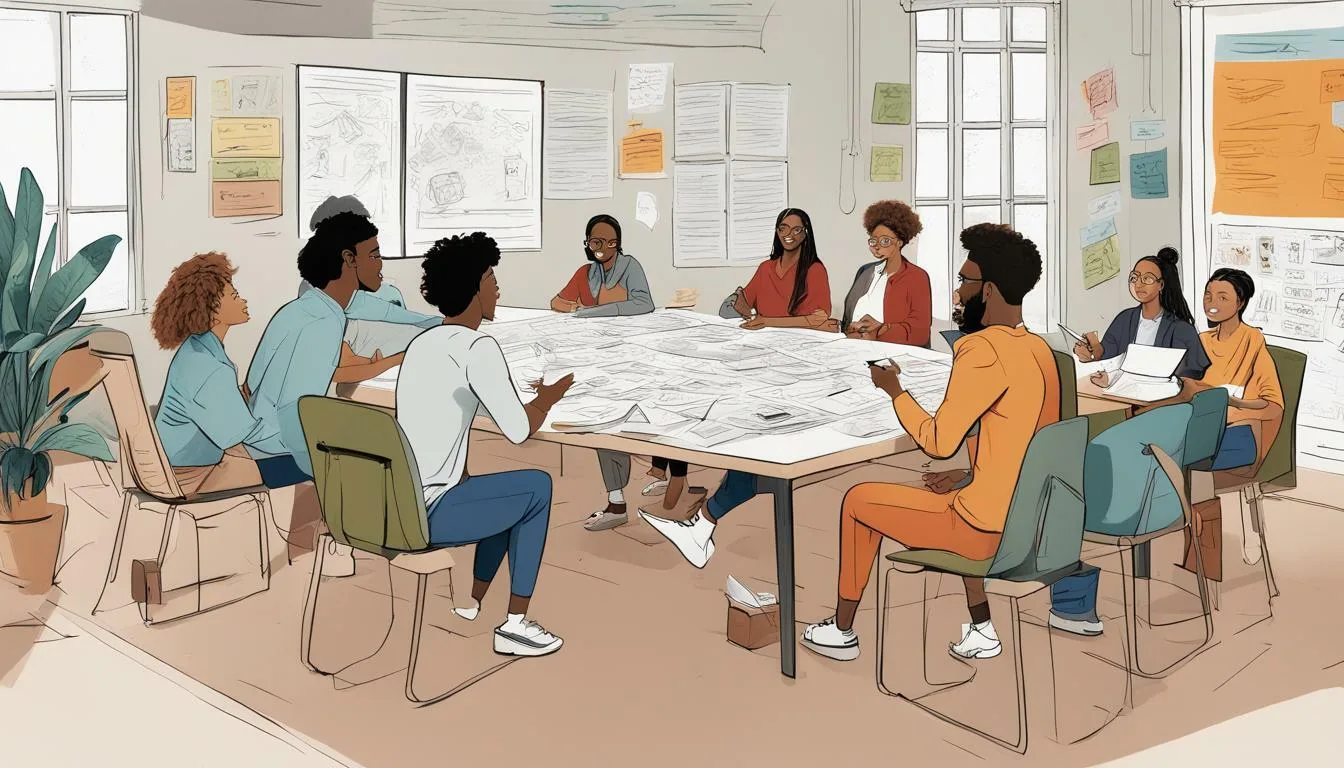They revised alone for weeks, stressed and stuck. Then they met in the library, shared notes, set simple roles, and something clicked. Marks went up, but so did confidence. They didn’t just study, they learned how to work as a team.
Group study is more than swapping flashcards. It builds clear talk, patient listening, shared problem solving, and trust. These are the same habits you need for group projects and future jobs. When you organise your study time well, you learn faster and work better with people.
This post shares practical tricks backed by educational studies and real student stories. You’ll see what actually works, not just what sounds nice. Every tip is easy to test with your own group.
Here’s what to expect. First, how to set goals and simple roles so no one drifts. Next, session formats that keep focus, like timed problem sprints and teach‑backs. Then, tools and ground rules that cut friction, build trust, and make decisions fast.
We’ll also cover feedback that helps, not hurts, so you fix gaps without drama. You’ll learn quick ways to handle conflict, plan who does what, and track progress without long meetings. Small tweaks, big gains.
By the end, you’ll know how to turn a study group into a team. You’ll get more done, feel less stress, and actually enjoy the work. Ready to organise your next session and realise what your group can do together?
Table of Contents
- Organise Your Group for Maximum Collaboration
- Use Interactive Tricks to Build Stronger Team Bonds
- Overcome Challenges and Reflect to Lasting Teamwork Gains
- Conclusion
Organise Your Group for Maximum Collaboration
Strong teamwork starts before the first study session. Get the right people together, agree on how you will work, then make sure each person has a part to play. Research links diverse groups with better ideas and stronger results, because people bring different angles and challenge weak thinking. See the Oxford view on why inclusion and diversity boost performance in practice in this piece from Saïd Business School: Why inclusion and diversity are key to business growth. You can also see related evidence on how diverse organisations improve outcomes in Social Forces: Engaging Differences: How Socially Diverse Organizations ….
Pick Diverse Members Who Complement Each Other
Aim for 3 to 5 people. Small enough to stay focused, large enough for fresh ideas. Choose members with different strengths, for example, one who is strong at maths, another who can explain concepts clearly, and a third who keeps calm under pressure.
This mix builds mutual reliance. You learn to ask for help, share workload, and see problems through others’ eyes. That practice grows empathy and cooperation.
Ask simple screening questions to check fit:
- What is your strongest subject?
- How do you like to study in a group?
- Do you prefer problem drills or teaching each other?
- What topic do you want to improve this month?
- How much time can you commit each week?
If two people have the same strength, that is fine. Look for balance across the whole group.
Set Clear Goals and Rules from the Start
Agree a shared target for each session, for example, cover one chapter in two hours and complete five past paper questions. Write goals in a shared document so everyone can track progress and add notes.
Set a few rules to support respect and focus:
- No phones on the table.
- Equal speaking time, use a timer if needed.
- Questions first, critiques after.
- Start with a quick check-in, end with actions.
These habits build accountability and respect. People feel safe to speak, own their tasks, and deliver.
Assign Roles to Encourage Everyone’s Input
Give each person a role so no one sits back:
- Timekeeper: runs the agenda and keeps pace.
- Note-taker: captures key steps, answers, and gaps.
- Question-asker: probes unclear points and tests understanding.
- Summariser: recaps takeaways and next steps.
Rotate roles every session. For example, the former note-taker becomes the summariser next time, and the question-asker switches to timekeeper. Rotation stops dominance, grows leadership and support skills, and mirrors how real teams share responsibility.
Use Interactive Tricks to Build Stronger Team Bonds
Interaction speeds up learning and strengthens relationships. When you explain ideas out loud, listen with care, and teach peers, you build shared understanding and trust. This lines up with Vygotsky’s view that people learn faster with guidance from others, also called scaffolding. If you want a quick refresher, see this clear summary of Vygotsky’s sociocultural theory.
Try Round-Robin Sharing for Better Listening Skills
Each person takes a turn to explain one part of the topic. Everyone else listens without jumping in. Rotate through the group until all parts are covered. Keep it brisk, for example 2 to 3 minutes per person.
Why it helps teamwork:
- Active listening grows when you hold questions to the end.
- Patience improves as you wait your turn and focus on clarity.
Gentle feedback guidelines:
- Start with what landed well.
- Ask a curious question, like “What is the key step before this?”
- Offer one tweak, not a pile of fixes.
- Use neutral language. Try “I heard” and “I wonder” instead of “You should”.
Quick steps:
- Set a timer and order of speakers.
- Take notes on the speaker’s main point.
- Share one comment or question each, then move on.
Incorporate Group Debates on Tricky Topics
Pick a thorny idea, like the causes of a historical event, and split into two sides. Debate pros and cons using short turns. Keep it civil, timed, and evidence based.
Why it builds team skills:
- Negotiation improves as you weigh trade-offs.
- Compromise grows when you adapt claims to shared facts.
Make it fair:
- Agree on a clear motion.
- Give equal time and alternate turns.
- Appoint a neutral chair to enforce rules and tone.
- End with a synthesis, not a winner.
Practice Peer Teaching to Boost Supportive Habits
Pair people so each teaches a weak area for the other. Use simple visuals, a quick whiteboard sketch, or a 5‑item quiz to check understanding. Peer teaching models support, which makes future help easier to ask for and give.
Team benefits:
- Mutual respect grows when everyone brings value.
- Psychological safety rises as small wins stack up.
Make it stick:
- Agree on one learning goal per mini‑lesson.
- Share one success out loud, for example “Your diagram clarified step 2.”
- Track wins in a shared doc to keep momentum.
Overcome Challenges and Reflect to Lasting Teamwork Gains
Every group hits bumps, from clashing views to drifting focus. Treat these moments as practice runs for real teamwork. With simple habits, you turn tension into trust and steady progress. For a quick primer on helpful basics, see Harvard’s guide on preventing and managing team conflict.
Resolve Conflicts with Open, Calm Discussions
Strong teams handle problems without drama. Use this short reset when tempers rise or messages cross.
- Pause. Take two minutes to breathe, sip water, and note the issue.
- Share aims. State the common goal so you all pull the same way.
- Use “I” statements. Try, “I feel frustrated when the plan changes late, because I need time to prepare.” Keep it short and concrete.
- Reflect back. One person repeats what they heard, then swaps.
- Seek options. List two or three fixes that protect the goal and people’s needs.
- Choose a next step. Assign a small action and a check-in time.
- Close with thanks. Acknowledge effort so the tone stays respectful.
Why this builds teamwork:
- Trust grows when feelings are clear and no one is blamed.
- Fair problem-solving improves when each voice is heard.
- Consistency reduces repeat flare-ups, which keeps study time focused.
Want more student-friendly tips? Georgia Tech shares practical steps on how to handle group conflict as a student.
End Sessions with Quick Team Reflections
Finish with a 10-minute wrap-up. Keep it brisk and honest.
- What went well?
- What should we improve next time?
- What did we learn about how we work together?
Capture highlights in a shared group journal. Note wins, like “clearer roles cut confusion,” and one tweak, such as “start with a problem list.” Rotate who leads the wrap-up. End by setting one actionable change for the next session.
Benefits you will notice:
- Self-awareness sharpens as patterns stand out.
- Continuous improvement becomes routine, not a big lift.
- Motivation rises because small wins are visible and shared.
Conclusion
The strongest gains came from simple habits used well. Small, diverse groups with clear goals, light roles, and timed focus built trust and pace. Short debates sharpened judgement, peer teaching grew confidence, and quick reflections kept progress steady. Calm conflict resets protected relationships and study time. These group study tips for teamwork skills do more than lift marks, they prepare you for projects, placements, and work.
Set a date this week, gather two to four friends, and run a 60‑minute trial. Rotate roles, try a problem sprint, then close with a five‑minute debrief and one change for next time. Keep a shared note so wins and actions do not vanish. Stay consistent for a month and watch both grades and teamwork skills rise. The best part is the lift you feel when a plan clicks, a tough idea lands, and everyone leaves proud of what you built together.
Thanks for reading. Share your first trial date or a small win in the comments, or pass this guide to a friend who needs a nudge.



